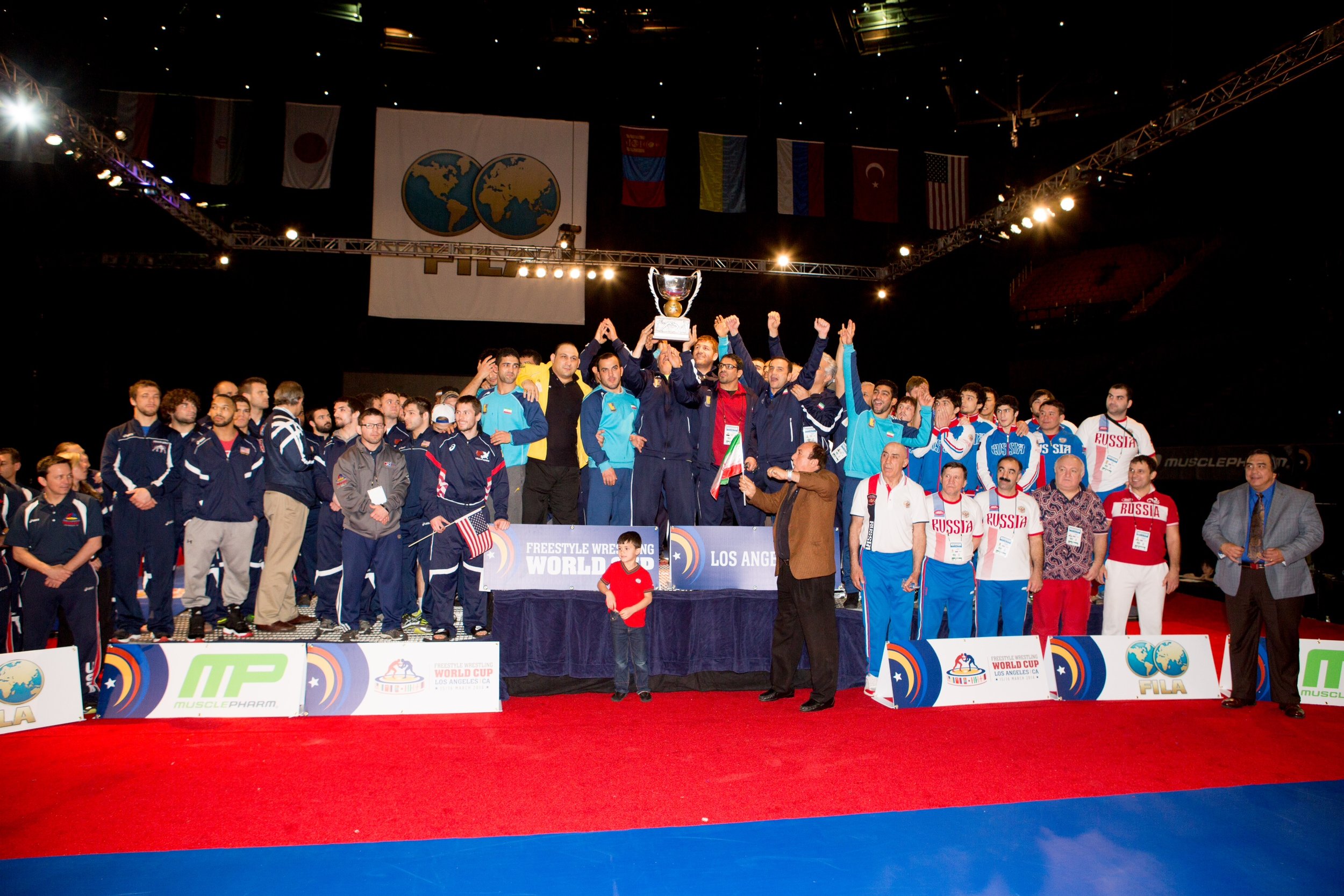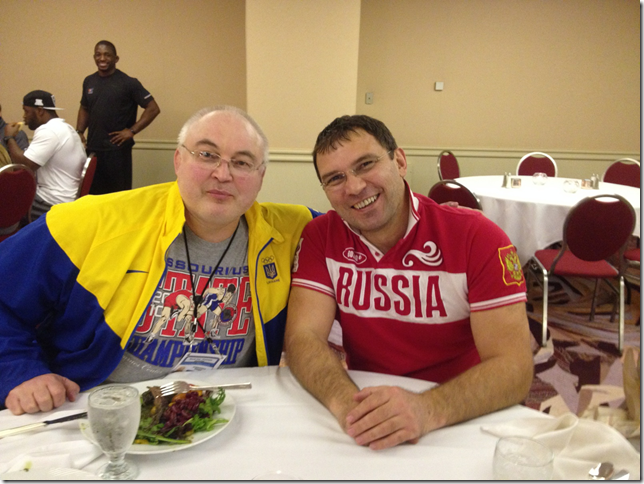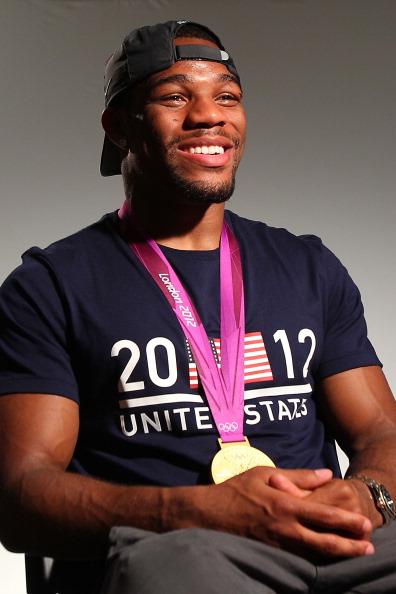With leadership comes responsibility. At wrestling’s freestyle World Cup Sunday in Los Angeles, the Iranian men’s wrestling team asserted it is, once again, best in the world. Now the challenge facing it — as well as everyone connected to the sport, indeed the broader Olympic movement — is as simple and elegant as it is vexing.
Are the Iranians — that is, its government, through its wrestling program — prepared to step up and show they will fully engage with the world?
If not, what is to be done?
Jordan Burroughs, the American champion, said these words after wrestling Sunday night, and while they were uttered in a slightly different context, they apply here as well: “I just want our sport to be great. I want people to give us the respect we deserve.”
There was great solidarity and sportsmanship on display over the weekend as wrestlers from Iran and the United States, from Ukraine and Russia, from Turkey and Armenia competed on the mat. There were handshakes. There was talk, meaningful talk, of “family.”
For that talk to be fulfilled, the Iranians have to wrestle all comers. Everyone. That means, should they appear, the Israelis.
In addition, for the sake of credibility and for the growth of wrestling, the Iranians must field a women’s wrestling team. Right now, they don’t.
These issues are vital. Wrestling last year escaped the death knell in a vote by the International Olympic Committee. It has a window — and that window is short — to keep proving to the IOC it is relevant in our 21st-century world.
In significant ways, wrestling advanced its case in this weekend’s action at the World Cup in Los Angeles, so much so that word is the 10-team World Cup is due back in LA in 2015.
At the same time, when your best team in your most important discipline is the projection of a state policy that is exclusionary and discriminatory — there’s no other way around it — that is a matter that calls not just for serious reflection but action.
“The challenge for us — not just for the Iranians — is that we are coming together not just for sport but for the betterment of mankind,” said Rich Bender, the executive director of USA Wrestling, evoking the aspirational ideal of the French baron Pierre de Coubertin, widely acknowledged as the founder of the modern Olympic movement.
“How do we do that?”
As a starting place:
If next year the World Cup is indeed back in Los Angeles, how about organizers pair up all 10 teams with area middle-schools and, as part of the program, organize a mandatory excursion for everyone — repeat, everyone — to the Museum of Tolerance on LA's Westside?
At every big-time soccer game, you see the players lining up at the start with kids. Pairing up with local schools would be a great way for the wrestling community to create outreach all kinds of different ways: it would help build needed community buzz around the World Cup, maybe jump-start a fund-raising opportunity for the schools and, along the way, raise awareness among everyone — again, everyone — of tolerance.
Who is opposed to tolerance?
If it’s the Iranian government, how does that position jibe not only with the ideals of the Olympic movement but with the Olympic charter? With the rules of FILA, the international wrestling federation?
No one outside Iran knows, for instance, why the Iranian wrestling team — due to come to LA last year immediately after an appearance in New York amid the Olympic reinstatement campaign — suddenly flew home. Or why it was OK this year to come to LA.
The Iranian athletes and coaches have, typically, been circumspect.
Further: no one on the outside knows whether the Iranian wrestlers were frustrated or upset — or otherwise — when denied the opportunity to come to LA last year.
Just like outsiders have no clue what is really going on when, as has been the case over the years at various events, Iranian athletes don’t show up to swim or suddenly fall ill at a taekwondo match when an Israeli is involved. Are the Iranian athletes themselves just as frustrated as anyone would seemingly be in that sort of situation?
Referring to last year’s planned trip to LA, Iranian wrestler Masoud Esmailpour Jouybari, who competes at 61 kilograms/134 pounds, speaking Saturday through a translator, said, “We were supposed to come last year but under some circumstances it didn’t happen.
“This is a place where many Iranians live, so the World Cup came here,” he said, meaning Southern California. “Hopefully, if it’s a great event, it can ease problems between the two countries.”
The axiom is that sports and politics are supposed to stay separate.
Reza Yazdani, the Iranian 2013 world champion at 97 kilos/213 pounds, had said Saturday, “It’s best if sports and politics don’t mix. In wrestling, it’s best if the politics stay out of the sport itself and people are able to appreciate the sport for what it is.”
This, though, is where they intersect.
FILA has done a commendable job of promoting the work of female referees, even — especially — at a male-only event such as the World Cup. The Iranians? They’re OK if a woman works as what’s called the “mat chairman” — that is, the official who sits table-side in the shadows and confirms the on-mat referee’s scores. But they “request” that a woman not work as the referee, as one did Sunday night in Burroughs’ 15-4 victory in the 74 kilogram/163-pound class over Ukraine’s Giya Chykhladze.
FILA officials are acutely aware of all of this. Rest assured Iran would otherwise have had the world championships by now.
It is reportedly the case, for instance, that official policy in Iran bars women from being spectators at events such as wrestling and soccer matches.
This is why Iran has been relegated to events on the calendar such as the 2013 World Cup, held in Teheran.
It’s also why there is no one from Iran on FILA’s ruling council, its bureau. Including the honorary president, a Rio 2016 coordinator, continental presidents, even a member suspended until next year, it features 24 personalities — and yet no one from Iran. It’s obvious why.
It's entirely uncertain whether isolation is the answer.
And the corollary — whether the regime believes it has sufficient leverage, confident the Olympic world would not want to do with Iran what was done years ago with South Africa over apartheid.
What to do about a country that has such passionate fans? If your metric is Facebook and Twitter, the United States is wrestling’s No. 1 fan base. No. 2? Iran. Measured by comments and shares, Iran is far and away your leader. The No. 1 city in the world for fan involvement? Teheran.
USA Wrestling sponsored the first American sports team to compete in Iran after the 1979 revolution. A U.S. freestyle team competed in the 1998 Takhti Cup in Teheran. Afterward President Clinton hosted the five wrestlers — Zeke Jones, Kevin Jackson, Melvin Douglas, Shawn Charles and John Giura — at the White House, with presidential spokesman Mike McCurry saying, “People-to-people contact is something useful for both nations.”
Jones is now the U.S. freestyle coach. He led the team to a third-place finish at the LA World Cup.
An American Greco-Roman team is due to go to Iran in May. The Americans have been to Iran 11 times since the revolution.
Iran’s LA World Cup delegation marked its 13th time a wrestling delegation has come to the United States since 1979.
Of course the stands Saturday and Sunday included plenty of women. No issues. The Iranian wrestlers waved to all in attendance. Some of the wrestlers even blew kisses.
As for people-to-people understanding, Iranian wrestler Hassan Rahimi, the 2013 world champion at 57 kilograms/125 pounds, said Sunday, “I have great memories from being here and being amongst Iranians. This is the first time our team has come to Los Angeles. We were supposed to come last year but some things came up and we couldn't make it.
“We're going to leave with a lot of really good memories and we hope to return. There's a lot to see in Los Angeles, Hollywood – for the worlds, it's one of the leading tourist destinations.”
On the mat, there can be no question of Iran’s dominance.
Iran won the 2013 freestyle world championships. Coming to Los Angeles, the Iranians had finished first or second in the last five World Cups, seven of the last eight.
In Saturday’s pool action, the Iranians were so much better than everyone — except for the Americans — that it was like watching a Mack truck square off in a demolition derby against a VW bug.
With rowdy — and knowledgeable — fans blowing horns and yelling “Iran!” the Iranians took it to Armenia, 8-0, and Turkey, 7-1. Then they defeated the Americans, 5-3.
On Sunday, the Iranians made short work of India, 8-0.
The domination of India was so thorough the Iranians did not give up a single point.
Against Turkey, three of the matches were 11-0; another was 11-1; a fourth was 10-0.
Two of the eight matches against Armenia ended in pins.
After rolling through Pool B, the Iranians met Russa — which had cruised undefeated through Pool A — in Sunday night’s finals.
Christakis Alexandridis, the Russian coach, had said Saturday that while he had a strong team, he also had a young team.
The Iranians, buoyed by the crowd, prevailed, 6-2. Four of the matches were shutouts.
Iran technical manager Ali Reza Rezaie said afterward, "We're really happy with the result. We're so glad we were able to make our fans here and in Iran proud. We plan to keep the success going."
For sure. Right?





